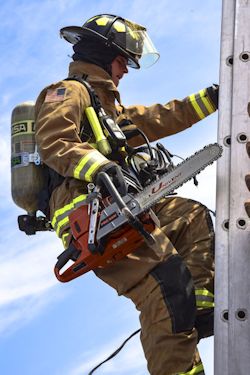Safe Ladder Use
Three-Point-Contact
This method is not the preferred method for climbing ladders.
The three-point-contact method requires a worker to depend solely on three points of contact with the ladder. The stomach or palm are examples of unstable points of contact; these points of contact are unreliable and lead to a false sense of stability.
Though some argue leaning against a surface is acceptable as a point of contact, there is a significant problem with this assumption. For example, if a worker has both feet on a ladder while resting one palm on the roof (three-point contact) they will not be able to prevent a fall if both feet were to slip.
Three-Point-Control
On the other hand, the three-point-control method requires a worker to use three of his or her four limbs for reliable, stable support. This climbing strategy could prevent many of the ladder falls and deaths occurring throughout the United States and world. The three-point-control method requires the worker to place his hand on the ladder in a way to support the full weight of the body if needed in an emergency. The breakaway force from a vertical rail is too great for a worker, male or female, to fully support their weight if only gripping with one hand. During a fall, the hand would slide down the bar until it contacts a rung on the ladder. The hand would most likely disconnect from the ladder when it collides with the rung. A vertical grip can only support approximately 50 percent of person's bodyweight.
Portable Ladder Safety
If a worker is using the three-point-control method and has both feet on the ladder and is gripping a horizontal rung, they are much less likely to fall if both of their feet were to slip. When a worker uses a horizontal grip, it allows for about a 75 percent to 94 percent increase in breakaway force. This compares to using a vertical grip, which allows the worker to hold their bodyweight and prevent a fall.
Keeping three-point-control for good support is critical while a worker is climbing, moving or working at an elevation. It is important to note, the three-point-control method is not a substitution for the use of fall protection equipment.
Knowledge Check Choose the best answer for the question.
1-8. Which climbing strategy requires three of a worker's limbs for reliable, stable support when climbing a ladder?
You forgot to answer the question!

